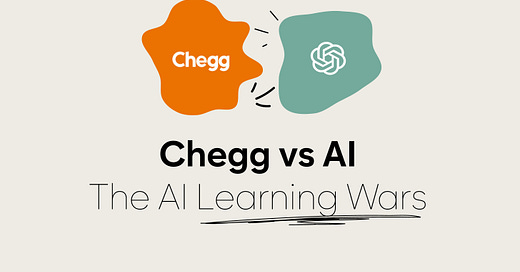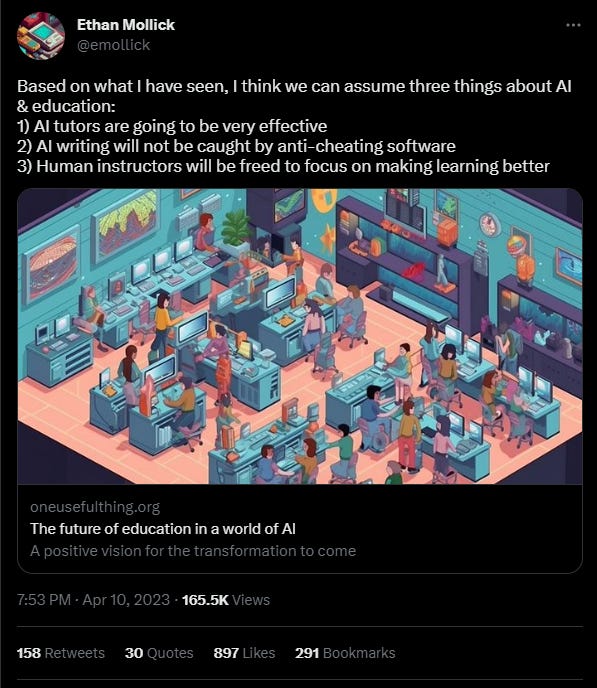Chegg, ChatGPT & the AI learning wars ⚔️ Transcend Newsletter #64
How AI startups are disrupting content-first companies
Hi there! Alberto here, joining from Madrid this week.
The Transcend Newsletter explores the intersection of the future of education and the future work, and the founders building it around the world.
We welcome 208 new readers to the newsletter since our last post. If you love reading about the future of education and work, hit the ❤️ button and share it with your friends!
Are you a founder building in the B2B space? Are you struggling with loooong sales cycles?
Then you need to join us this Wednesday for this Open Discussion on Product-led Growth 🚀 with Graham Forman, Managing Director of Edovate Capital and investor in Pear Deck, BookNook or ClassWallet among many others. He’s a friend of Transcend, and our go-to person for all things K-12 GTM!
If you are a founder and want more of these, you should sign up for our weekly founder emails! We host weekly events like this one, and share operational articles for early-stage founders in edtech.
Last week, edtech made it back into the headlines, but for the wrong reasons:
ChatGPT had claimed its first victim, and it was the edtech unicorn Chegg.
In a disappointing Q1 earnings call, Dan Rosensweig (Chegg’s CEO) admitted that ChatGPT was having a significant impact on its ability to bring on new students to its service. By the end of the day, its stock was down by 50%, cutting down billions from its market cap.
“Since March we saw a significant spike in student interest in ChatGPT. We now believe it’s having an impact on our new customer growth rate.”
College students are going to ChatGPT to answer its homework and study questions, rather than signing up to Chegg. That’s having a real impact on Chegg’s growth: its quarterly revenue was down 7% year-over-year (down to $187.6 million) as it became the first publicly-traded company to admit the direct negative impact ChatGPT had on its product.
But first, what exactly does Chegg do?
Chegg is an edtech OG – it’s been a publicly traded unicorn for a decade now, and saw its popularity rise through COVID as university students went fully online.
It started off as a textbook rental company, and pivoted to a digital subscription model that supports college students with studying and homework.
Today, over 5M students are subscribed to its service, which bundles self-paced homework support (explanations from textbooks, guides, Q&As), study tools (practice sets, flashcards), writing support, and other tools like citations, language learnings and career advice.
Anecdotally, most Chegg users I know are college students looking for answers to their textbook’s questions.
The ChatGPT news came during a particularly difficult time for Chegg: after peaking at a $15B+ market cap during COVID, its stock has tumbled since then as universities re-opened their doors and college enrolment has shrunk. This recent news has a lot of people asking: is ChatGPT killing Chegg?
Is Chat GPT killing Chegg?
The AI optimists see the writing on the wall for Chegg: the main argument is that students will increasingly go to AI tools to find original answers (ChatGPT), rather than pre-made content from users and experts (Chegg).
ChatGPT isn’t perfect, but it’s captured the interest of the general public and students: even if they can only get 90% of the answer right, the ability to get it for free, anytime and in a conversational interface is winning over students. The pain for Chegg has no signs of stopping anytime soon.
A lot of it is self-inflicted pain too: Chegg made it a strategy to diversify from its core college student subscription for years, but failed to do so: 90% of its revenue still came from these subscribers in the last quarter (up roughly 5% from last year), which has made it so much more vulnerable to new competition like ChatGPT, but also to decreasing college enrolment (which reduces its student base).
The case for Chegg
And yet, it’s not all bad for Chegg, some industry observers say.
Their main argument I’ve seen folks focus on is the strength of its proprietary data: Chegg has student-generated answers and explanations to textbook questions across all US universities, subjects and textbooks, which is all proprietary data that can be used to build a unique AI learning product.
Take this example from Matt Tower from Edtech Thoughts:
“If you have an old textbook lying around, I encourage you to ask ChatGPT some homework questions. The answers are, generally, not particularly helpful.”
By contrast, Chegg has a database of the answer keys to almost every textbook question asked in the past 20 years, which it can reference almost instantaneously.”*
ChatGPT doesn’t cut it just yet, especially in some subjects like math where user-generated content is superior to the AI-generated ones.
After Chegg was hit hard by public market investors, it unveiled its response to ChatGPT: Cheggmate. Funnily enough, Cheggmate is an AI learning assistant built in partnership with (…checks notes…) Open AI. It will help Chegg users get personalized learning support across subjects, using its proprietary data to power a powerful learning bot.
Is Chegg positioned to use this data and build a unique AI learning product? They haven’t yet launched it, so we will have to wait to know.
Pedagogy > Content
Here is my take on this whole situation: I don’t believe that the data moat that Chegg may have is enough to stave off competition from new AI learning products that use LLMs to substitute user-generated content for education.
This isn’t just about Chegg, but more so about edtech companies that are content-first. Content-first companies have dominated edtech for a long time, like publishers (Pearson, McGraw Hill or Willey) and user and expert-generated content platforms (Chegg, Course Hero or Quizlet).
AI is driving down the cost to creating educational content to almost 0, so anyone can create good enough educational content as a commodity. This means that the most effective AI learning products won’t be those that give you the most precise answer (the best content) but those who guide you through your learning struggles most effectively (the best pedagogy). It more about the questions AI asks the student, rather than the answers it gets.
You can see how Sal Khan puts this to practice in his demo of Khanamigo: the AI bot is not giving the student the answer, despite repeated attempts from the student, but rather guiding the student to the right framework to solve it individually.
Most education content startups don’t have a unique pedagogy in their product, other than giving you the answer directly. For the time being, the user and expert-generated answers will be more precise than those generated by AI startups. But as LLMs proliferate through low-cost and high precision tuning, I think it’s a matter of time until content gets commodified.
Eventually, generative AI product will always beat you at creating the most relevant and personalized content, but it won’t beat you at learning, which is where startups need to re-focus their energy. The new wave of AI startups will slowly take over content-creating edtech startups, in a way that will benefit students.
The writing is on the wall for edtech companies: if you don’t have a strong pedagogy as an edtech product, you are very, very vulnerable to AI. Chegg is the first startup to get disrupted by AI, but won’t be the last.
One last reminder…
If you are a founder building in the K-12 space and you are struggling with growth, you need to join us this Wednesday for this Open Discussion on Product-led Growth with Graham Forman!
Graham is the founder of Edovate Capital and has previously invested in startups like Pear Deck, BookNook and ClassWallet. He’s a friend of Transcend, and our go-to person for all things K-12 GTM.
Thank you for reading!
Did you enjoy reading this piece?
Hit the ❤️ button to help us reach more awesome people like you!
Alberto











Great work Alberto! I appreciate the thoughtfulness with which you approach the discussion!
Great article. I agree with the fact that textbooks will be commoditized as we discussed back in February. This content
is not only going to zero cost, it’s pretty much going to be low value. It’s not about content first. It’s about having the wrong type of content.
Pedagogy is critical. But AI tutors to date haven’t been designed with evidence-based practice so we still haven’t seen what’s to come IMHO. Putting a straw on GPT isn’t a MOAT.